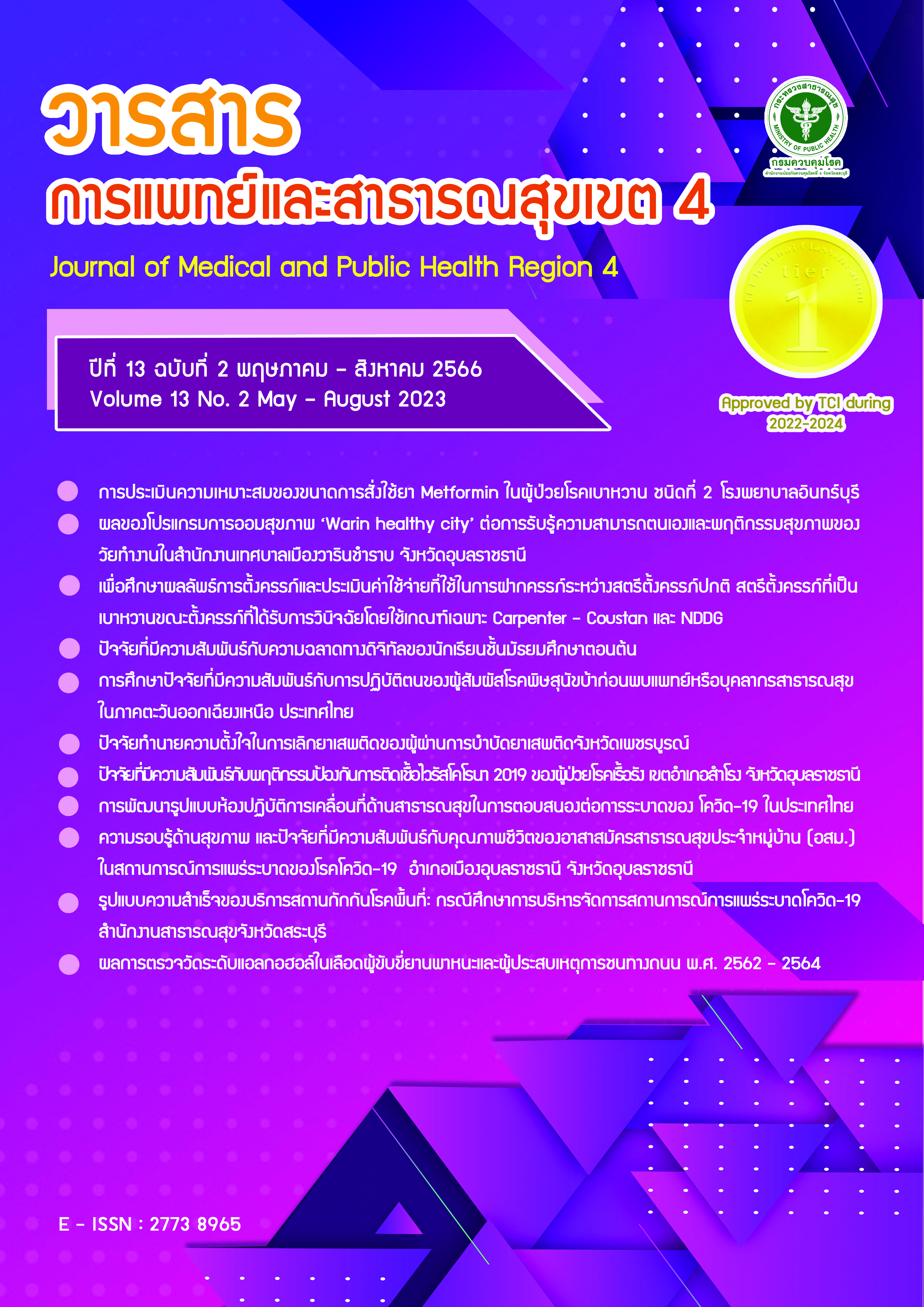Predictors of intention to stop substance abuse users after receiving addiction treatment in Phetchabun Province
Main Article Content
Abstract
This descriptive research aimed to study the level of intention to stop substance abuse and predictors of intention to stop using substances among users after receiving addiction treatment in Phetchabun province. The sample consisted of 128 people. The reliability value of the whole questionnaire was 0.951 and the reliability values of each part of the questionnaire were between 0.720 - 0.963. The data were analyzed by multiple linear regression. The results of the study showed that the majority of the sample (84.40%) had the level of intention to stop substance abuse at the highest level. Significant predictors of intention to stop substance abuse were marital status (divorced or separated or widowed), normative beliefs, perceived behavioral control, and attitudes toward behavior. These factors predict 36.20 % of the variation of intention to stop substance abuse among users. Knowledge gained from this study suggests that the related organizations should study and develop a treatment model for substance abuse users that promotes positive attitudes toward behavior and perceived behavioral control. Norm’s participation should be included in the treatment process.
Article Details

This work is licensed under a Creative Commons Attribution-NonCommercial-NoDerivatives 4.0 International License.
References
United Nations Office on Drugs and Crime. World Drug Report 2020 [internet]. Vienna: United Nations Office on Drugs and Crime (UNODC); 2021 [cited 2021 March 23]. Available from:https://wdr.unodc.org/wdr2020/en/index2020.html
Office of the Narcotics Control Board. Report on the prevention and solution of drug problems for the fiscal year 2019. Bangkok: Office of the Narcotics Control Board; 2020. (in Thai)
Chusuntia W, Pinijsunthorn S. The effects of drug use among patients treated at Thanya Raksa Hospital, Udon Thani: a case study. Journal of Community Health Development Khon Kaen University 2017, 5(3):528-9. (in Thai)
Office of the Secretariat of the Drug Addicts Treatment and Rehabilitation Committee. Report on the treatment and rehabilitation of drug addicts [internet]. Bangkok: Drug addiction treatment and rehabilitation information system of the country; [publisher unknown]; [date unknown] [cited 2021 March 30]. Available from: https://antidrugnew.moph.go.th/ /Form/FrmDownloadData/ (in Thai)
Department of Women's Affairs and Family Institutions. Report on the situation of domestic violence for the year 2019. Bangkok: Department of Women's Affairs and Family Institutions; 2020. (in Thai)
Intrasuwan P. The Effectiveness of the Implementation of the UN Special Assembly Resolution on the World Drug Problem 2016 (2016) in Thailand. Journal of the Ombudsman 2021; 14(2):69-111. (in Thai)
Office of the Narcotics Control Board. Drug Code 2021. Bangkok: Office of the Narcotics Control Board; 2021. (in Thai)
Chantarach N. Consultation results of behavioral behavior groups. Intelligence on substance abusers' willingness to quit. J Med Health Sci 2018; 25(1):38-49. (in Thai)
Ajzen, I. The Theory of Planned Behavior. Organizational Behavior & Human Decision Processes 1991; 50(2):179-211.
Wayne W., D. Biostatistics: A foundation of analysis in the health sciences. 6th ed. John Wiley & Sons, Inc; 1995.
Yoosukcharoen J.Factors predicting intention to quit smoking among patients with chronic non-communicable diseases [Master of Public Health]. Bangkok: Thammasat university; 2017. (in Thai)
Sakulpong N. The development of the intention to quit drug use among female drug addicts. Journal of Nursing and Health Care 2015; 33(3):144-51. (in Thai)
Chusak T, Suttasilp M, Sasang N. Factors predicting intention to quit using drugs of people who passed drug treatment camps in Nakhon Sawan Province. Sukhothai Thammathirat Open Journal 2017; 30(1):88-100. (in Thai)
Liu L, Wang H, Wing H, Cao L. Chinese Drug Users’ Abstinence Intentions: The Role of Perceived Social Support. Journal of Drug Issues 2018; 48(4):519-35.
Supawong A.The effectiveness of treatment for drug-addicted patients according to an applied psychosocial therapy model. Thung Song Hospital Songkhla Nakarin Journal of Nursing 2016; 36(special):160-70. (in Thai)
Purephongphakawat A. Factors predicting family and community social support and methamphetamine addiction cessation at Nong Ki Hospital, Buriram Province. Journal of Health Center 9 2020; 11(33):22-34. (in Thai)
Sareelae N. Factors affecting intention to stop substance abuse among users addicted treatment at Thanyarak Udonthani Hospital. NHEJ [Internet]. 2018 Dec. 31 [cited 2023 Mar 31];1(3):35-42. Available from: https://he02.tci-thaijo.org/index.php/NHEJ/article/view/165495. (in Thai)
Booth BM, Stewart KE, Curran GM, Cheney AM, Borders TF. Beliefs and attitudes regarding drug treatment: application of the theory of planned behavior in African-American cocaine users. Addict Behav. 2014 Oct;39(10):1441-6.doi:10.1016/j.addbeh.2014.05.012. Epub 2014 May 28. PMID: 24930051; PMCID: PMC4123798.
Kaewmat N, Chaisena J, Punnotok P, Dejchaiyot P, Boonprachum S. Factors Affecting Substance Abuse Intentions among Substance Abuse Youths . J Hlth Sci Res [Internet]. 2017 Jun. 30 [cited 2023 Mar. 31];11(1):133-40. Available from: https://he01.tci-thaijo.org/index.php/JHR/article/view/91417 (in Thai)
Chanchuangchot T. Psychosocial Factors Affecting Children and Youth's Willingness to Quit Drugs. Journal of Academic Resources Prince of Songkla University. 2020;30(1):200-10. (in Thai)
Zemore SE, Ajzen I. Predicting substance abuse treatment completion using a new scale based on the theory of planned behavior. J Subst Abuse Treat. 2014 Feb;46(2):174-82. doi: 10.1016/j.jsat.2013.06.011. Epub 2013 Aug 15. PMID: 23953167; PMCID: PMC3840042.


